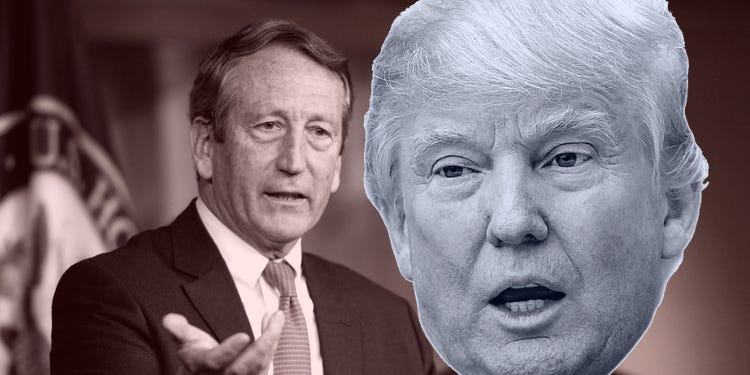
Rumors have been swirling that former congressman and state governor, Mark Sanford, may join Bill Weld and Joe Walsh in issuing a Republican primary challenge to President Trump. None of these three stand a chance of defeating Trump, of course, but that doesn’t mean they haven’t gotten the president's attention:
Can you believe it? I’m at 94% approval in the Republican Party, and have Three Stooges running against me. One is “Mr. Appalachian Trail” who was actually in Argentina for bad reasons....
— Donald J. Trump (@realDonaldTrump) August 27, 2019
For those of you confused by the “Appalachian Trail” remark, Trump is referring to the high-profile revelation of Sanford’s extra-martial affair, 10 years ago with a woman in Argentina, while Sanford was still the Governor of South Carolina. At the time, to explain his almost week-long disappearance from the public eye, Sanford’s staff claimed that he was instead hiking the Appalachian Trail.
And for those of you confused by how Trump, who has cheated on all three of his wives (including with a porn star he later paid to keep quiet about it), can blast someone’s marital infidelity without setting himself up for enormous mockery, let’s just concede that both shame and self-awareness are effectively dead in today’s politics.
(Unless, of course, Trump was making a purely nationalist argument, being that Sanford's affair was abroad, while Trump's affairs were domestic. Perhaps the issue can be solved with tariffs.)
Anyway, at best, a vote for any of Trump’s primary opponents will serve only as a protest message from Republicans and conservatives who have had it with the president. This isn't necessarily a bad way of voicing such discontent. In fact, I think it’s a good idea, if only for the sake of a substantive debate on the party’s future.
But there’s a problem. Each of these challengers or potential challengers carries baggage that muddies that message.
With Sanford, it’s the Appalachian Trail. With Weld, it’s his description of himself as “the most pro-choice person you’re ever going to meet.” And with Walsh, it’s a documented history of racist and other incendiary comments, conspiracy theories, and even suggestions of violence (including in support of Trump in 2016).
I think we can fairly say that Walsh more than just "muddies" the message. He may well take a blowtorch to it.
All of these individuals (and any others that eventually step forward) will of course be lambasted by President Trump, the GOP establishment and the conservative media (which are undeniably beholden to Trump), and Trump supporters. No surprise there.
What does surprise me (a little bit anyway) are the expressed reactions of some on the right, including people I very much like and respect, who are by no means Trump enthusiasts.
A couple of examples:



Again, I agree with the point about tainted messaging. I also understand (and share) the frustration a lot of people have with Bill Kristol and others who are so fervently anti-Trump that they would support literally any Republican (and a number of Democrats), including Joe Walsh, just because it could potentially weaken the president.
But I think it needs to be said that Mark Sanford is no Joe Walsh.
He’s also no Donald Trump.
Painting all three with the same brush, suggesting they are immorally equivalent, and concluding that they’re equally bad choices, seems...a bit unfair.
Unless Sanford has a history of racist remarks, wild conspiracy theories, incendiary rhetoric, alarmingly thin skin, and a breathtaking incapacity to tell the truth, I think his standing is notably better.
Believe me when I say I have no particular affection for Sanford. I agree with him on a lot of political issues (he's a small-government, free-market guy who gets foreign policy), but that’s a separate thing from character issues. I’m largely indifferent on his possible candidacy, and ten years ago I was shaking my head at the embarrassing details of his well-publicized affair like everyone else.
But if cheating on one’s wife makes someone no better nor fit to serve than…let’s say Donald Trump, what does that say about someone like… John McCain?
I mean, I don’t think anyone other than the loyal Trump faithful (who thought McCain was the devil) would argue that McCain wasn’t more fit to serve and more morally decent and competent than Donald Trump, despite McCain's marital indiscretions during his first marriage.
Thus, should that issue alone forever define someone as an individual or a leader?
“Yes” is certainly a valid answer if applied consistently, but it’s worth remembering that the issue has been barely visible on the political right, even in presidential politics, for quite some time. For better of for worse, the card wasn’t played against a number of prior Republican candidates, including McCain, Rudy Giuliani, Newt Gingrich, and even Donald Trump in 2016 (when his affairs during his first two marriages were quite well known).
I'm not defending cheating, of course, nor will I ever. It's a betrayal of trust that is real, consequential, and absolutely fair game when weighing an individual’s moral character. But should it be the only and eternal measure of someone, when evaluating their fitness for office?
I think a sense of perspective is important — the same sense many of us apply when contrasting the insincerity of the average politician with the habitual and persistent dishonesty of President Trump. Some failings are definitive of the person. Others, hopefully, can be redeemed.
Yes, it’s frustrating for us conservative Trump critics and skeptics that we don’t have a particularly compelling or viable Republican alternative to the president, going into 2020. But I also don’t think we should let that frustration shelve our sense of perspective.
If our instinct is to cast any transparently flawed challenger to Trump as “the same as Trump,” and thus deem them disqualifying, aren’t we undercutting our larger thesis on why Trump should be challenged in the first place?












